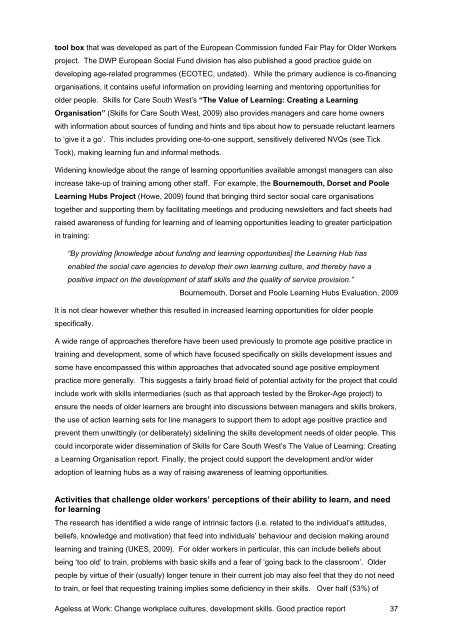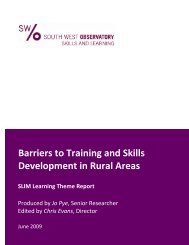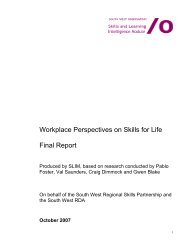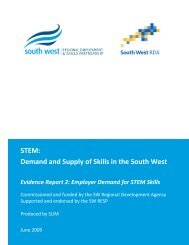Ageless at Work - Skills for Care
Ageless at Work - Skills for Care
Ageless at Work - Skills for Care
You also want an ePaper? Increase the reach of your titles
YUMPU automatically turns print PDFs into web optimized ePapers that Google loves.
tool box th<strong>at</strong> was developed as part of the European Commission funded Fair Play <strong>for</strong> Older <strong>Work</strong>ers<br />
project. The DWP European Social Fund division has also published a good practice guide on<br />
developing age-rel<strong>at</strong>ed programmes (ECOTEC, und<strong>at</strong>ed). While the primary audience is co-financing<br />
organis<strong>at</strong>ions, it contains useful in<strong>for</strong>m<strong>at</strong>ion on providing learning and mentoring opportunities <strong>for</strong><br />
older people. <strong>Skills</strong> <strong>for</strong> <strong>Care</strong> South West’s “The Value of Learning: Cre<strong>at</strong>ing a Learning<br />
Organis<strong>at</strong>ion” (<strong>Skills</strong> <strong>for</strong> <strong>Care</strong> South West, 2009) also provides managers and care home owners<br />
with in<strong>for</strong>m<strong>at</strong>ion about sources of funding and hints and tips about how to persuade reluctant learners<br />
to ‘give it a go’. This includes providing one-to-one support, sensitively delivered NVQs (see Tick<br />
Tock), making learning fun and in<strong>for</strong>mal methods.<br />
Widening knowledge about the range of learning opportunities available amongst managers can also<br />
increase take-up of training among other staff. For example, the Bournemouth, Dorset and Poole<br />
Learning Hubs Project (Howe, 2009) found th<strong>at</strong> bringing third sector social care organis<strong>at</strong>ions<br />
together and supporting them by facilit<strong>at</strong>ing meetings and producing newsletters and fact sheets had<br />
raised awareness of funding <strong>for</strong> learning and of learning opportunities leading to gre<strong>at</strong>er particip<strong>at</strong>ion<br />
in training:<br />
“By providing [knowledge about funding and learning opportunities] the Learning Hub has<br />
enabled the social care agencies to develop their own learning culture, and thereby have a<br />
positive impact on the development of staff skills and the quality of service provision.”<br />
Bournemouth, Dorset and Poole Learning Hubs Evalu<strong>at</strong>ion, 2009<br />
It is not clear however whether this resulted in increased learning opportunities <strong>for</strong> older people<br />
specifically.<br />
A wide range of approaches there<strong>for</strong>e have been used previously to promote age positive practice in<br />
training and development, some of which have focused specifically on skills development issues and<br />
some have encompassed this within approaches th<strong>at</strong> advoc<strong>at</strong>ed sound age positive employment<br />
practice more generally. This suggests a fairly broad field of potential activity <strong>for</strong> the project th<strong>at</strong> could<br />
include work with skills intermediaries (such as th<strong>at</strong> approach tested by the Broker-Age project) to<br />
ensure the needs of older learners are brought into discussions between managers and skills brokers,<br />
the use of action learning sets <strong>for</strong> line managers to support them to adopt age positive practice and<br />
prevent them unwittingly (or deliber<strong>at</strong>ely) sidelining the skills development needs of older people. This<br />
could incorpor<strong>at</strong>e wider dissemin<strong>at</strong>ion of <strong>Skills</strong> <strong>for</strong> <strong>Care</strong> South West’s The Value of Learning: Cre<strong>at</strong>ing<br />
a Learning Organis<strong>at</strong>ion report. Finally, the project could support the development and/or wider<br />
adoption of learning hubs as a way of raising awareness of learning opportunities.<br />
Activities th<strong>at</strong> challenge older workers’ perceptions of their ability to learn, and need<br />
<strong>for</strong> learning<br />
The research has identified a wide range of intrinsic factors (i.e. rel<strong>at</strong>ed to the individual’s <strong>at</strong>titudes,<br />
beliefs, knowledge and motiv<strong>at</strong>ion) th<strong>at</strong> feed into individuals’ behaviour and decision making around<br />
learning and training (UKES, 2009). For older workers in particular, this can include beliefs about<br />
being ‘too old’ to train, problems with basic skills and a fear of ‘going back to the classroom’. Older<br />
people by virtue of their (usually) longer tenure in their current job may also feel th<strong>at</strong> they do not need<br />
to train, or feel th<strong>at</strong> requesting training implies some deficiency in their skills. Over half (53%) of<br />
<strong>Ageless</strong> <strong>at</strong> <strong>Work</strong>: Change workplace cultures, development skills. Good practice report 37








